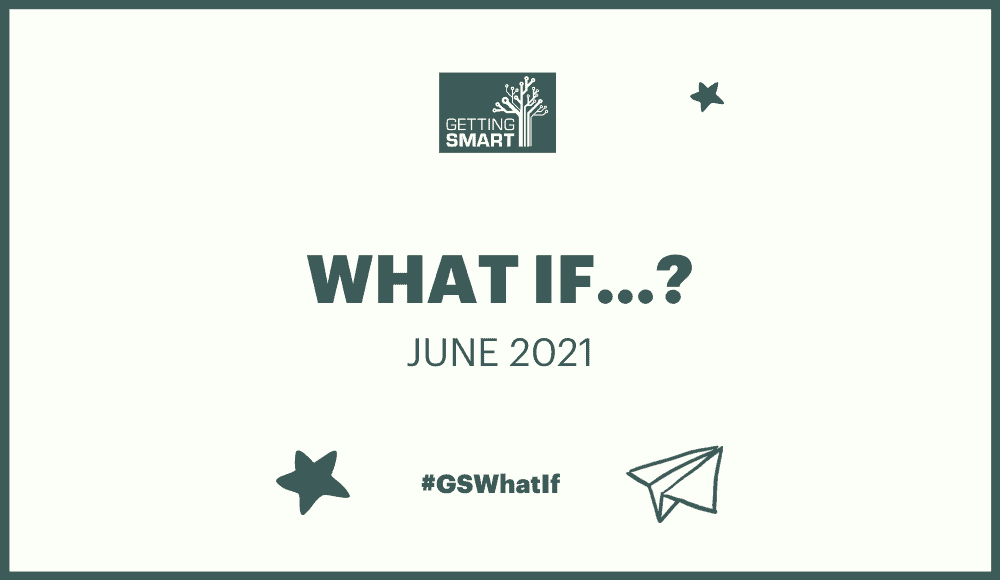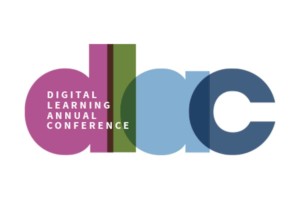What If?: June Recap

It has been a month of weekly “What if?” questions. If you missed the campaign announcement, feel free to read more about the backstory here and sign up for the newsletter to make sure you never miss a question! We look at these questions as a way to inspire change and thought about the future of learning and to get an idea of what you’re wondering about, what you’re thinking about and more. If any of these questions inspire you to write, feel free to email [email protected] with your thoughts or a blog submission.
This month we asked some of the following questions:
What if school was organized around contribution rather than extraction?
This question was inspired by our recent Difference Making campaign
We received this answer from Joe Kirstein of Episcopal Day School:
In their book, Four-Dimensional Education Charles Fadel, Maya Bialik, and Bernie Trilling argue that 21st country education must evolve beyond the standard practice of simply delivering content. Students who will enter a modern workplace will not only need to possess a breadth of knowledge, but they must also have a variety of skill sets, strong character, and become meta learners who are aware that a person’s education is an ongoing quest throughout life.
An educational environment that rewards students for their contributions to their community as well as to their fellow students is one answer to the four-dimensional model that they describe. When students find needs within their community and work with their peers to identify solutions to that problem, they will by default acquire knowledge as they apply what they are learning in school to actual situations. In the process, students would also build oral and written communication skills, problem-solving skills and become better equipped to empathize with situations outside of their experience.
Students who would come from such a unique educational experience would be much better equipped to take on the unknown problems of the future workforce as the rate of change in both culture and society continues to accelerate.
What if we stopped asking students what they want to be when they grow up and instead ask what problem do you want to solve?
Problem-solving is key to learning, leading, & thriving no matter what the world will require or look like in 5 or 20 years from now. We must intentionally provide students with interdisciplinary opportunities to discover, voice, choose & find ways to address problems. #GSWhatIf
— Dr. Patricia Griffin ❤️🧠💡 #HEARTMINDZONE (@Drgriffin216) June 1, 2021
What if we valued “original” over “perfect” in learning?
This question was from our friends at Socrates Head of School and was inspired by Original by Adam Grant. Read a distillation for edleaders here.
Questions from you:
#gswhatif What if instead of devising master schedules based on curriculum mandates, we instead scheduled based on the needs of the learning experience. pic.twitter.com/YnnlROZSx7
— Kyle Wagner (@kwagssd3) May 19, 2021
What if “school” was where the student wanted to learn on a personalized pathway for that day – that hour – that moment? #GSWhatIf #LearnerCentered #personalized
— Carrie Pratt, Ed.D., CETL (@CarriePrattEdD1) May 4, 2021
What if teacher PD looked like #geniushour for teachers? #GSWhatIf
— Andrea Kornowski (@andreakornowski) May 26, 2021
What if? All teaching and learning was centered around Creativity Based Learning? And all students approached new ideas with open hearts and open minds? #GSWhatif #CreativeAgentsOfChange @Getting_Smart @edutopia @tvanderark @AdamKulaas https://t.co/wUuOkRAaxS via @Getting_Smart
— CuriositaTeaching (@CuriositaTeach) May 15, 2021
Thanks for following along with these questions! Please let us know which ones stuck out to you and which ones you’re still thinking about.
Stay in-the-know with innovations in learning by signing up for the weekly Smart Update.







0 Comments
Leave a Comment
Your email address will not be published. All fields are required.